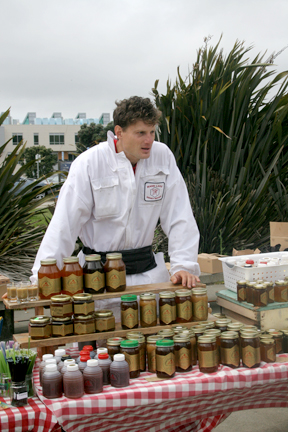New farmers’ market sells honey for allergy relief
By Fleur Bailey
The Guardsman

Allergy sufferers feeling the unpleasant effects of pollen in the spring blooms may now find some relief in the form of local honey, which will be sold from a stall at Ocean campus.
Allergies have been out in full-form this month, and sufferers don’t always find relief from over-the-counter medicines for coughing, sneezing, runny nose, itchy and watery eyes.
The good news is there is a simple and effective way of keeping allergies under control — local honey. Marshall’s Farm, which produces honey from the San Francisco Bay Area will be selling their honey from a stand on the Ocean campus of City College at a local farmers’ market.
The CCSF Green Corps and the Associated Student Council, began holding a farmers’ market at Ram Plaza on April 19, featuring locally grown organic produce and organic food.
“A farmers’ market is a focal part of community life,” said Zen Trenholm, vice-president of finance for the CCSF Green Corps. “There is no other farmers’ market close by, so we want it to be as much shocking as it is educational, to buy local fresh produce.”
Rokas Armonas, a foreign exchange student from Lithuania who studies beekeeping management and works for Marshall’s Farm said consuming locally grown organic raw honey works best for helping combat allergies.
“Fresh honey that is still alive builds an immunity to the pollen outside,” Armonas said.
When the bees gather the pollens they bring them to the hive and are blended with the honey that they produce. Consuming honey produced within a 50-mile radius from where you live and work, harvested in the present season, helps the body’s immune system build up a resistance to the pollens that are causing the allergies.
There are many other benefits of honey, alongside helping to prevent allergies. According to Benefits-of-honey.com, honey also has antiseptic, antioxidant and cleansing properties. It can help with weight loss and cholesterol, sleeplessness, stress, and many skin ailments including acne, athlete’s foot and eczema.
Honey contains a wide variety of vitamins, including B6, B1, B2 and B5, and minerals such as calcium, copper, iron, magnesium, manganese, phosphorous, potassium, sodium and zinc, as well as anti-oxidants and amino acids.
“We want to provide education about local honey and how it helps,” Armonas said. “We harvest honey every week and bring it fresh. We would like to see the response and how it works.”
Trenholm said so far they have around 12 other local farmers interested in participating in the market at City College, which typically sells field-ripened fresh fruits and vegetables; freshly baked breads and pastries; flowers, gourmet appetizers and gifts; fresh fish, nuts, mushrooms and more.
The next farmers’ market will be held at the Ocean campus Ram Plaza from 10 a.m. – 5 p.m. on May 3.
Allergies have been out in full-form this month, and sufferers don’t always find relief from over-the-counter medicines for coughing, sneezing, runny nose, itchy and watery eyes.
The good news is there is a simple and effective way of keeping allergies under control — local honey. Marshall’s Farm, which produces honey from the San Francisco Bay Area will be selling their honey from a stand on the Ocean campus of City College at a local farmers’ market.
The CCSF Green Corps and the Associated Student Council, began holding a farmers’ market at Ram Plaza on April 19, featuring locally grown organic produce and organic food.
“A farmers’ market is a focal part of community life,” said Zen Trenholm, vice-president of finance for the CCSF Green Corps. “There is no other farmers’ market close by, so we want it to be as much shocking as it is educational, to buy local fresh produce.”
Rokas Armonas, a foreign exchange student from Lithuania who studies beekeeping management and works for Marshall’s Farm said consuming locally grown organic raw honey works best for helping combat allergies.
“Fresh honey that is still alive builds an immunity to the pollen outside,” Armonas said.
When the bees gather the pollens they bring them to the hive and are blended with the honey that they produce. Consuming honey produced within a 50-mile radius from where you live and work, harvested in the present season, helps the body’s immune system build up a resistance to the pollens that are causing the allergies.
There are many other benefits of honey, alongside helping to prevent allergies. According to Benefits-of-honey.com, honey also has antiseptic, antioxidant and cleansing properties. It can help with weight loss and cholesterol, sleeplessness, stress, and many skin ailments including acne, athlete’s foot and eczema.
Honey contains a wide variety of vitamins, including B6, B1, B2 and B5, and minerals such as calcium, copper, iron, magnesium, manganese, phosphorous, potassium, sodium and zinc, as well as anti-oxidants and amino acids.
“We want to provide education about local honey and how it helps,” Armonas said. “We harvest honey every week and bring it fresh. We would like to see the response and how it works.”
Trenholm said so far they have around 12 other local farmers interested in participating in the market at City College, which typically sells field-ripened fresh fruits and vegetables; freshly baked breads and pastries; flowers, gourmet appetizers and gifts; fresh fish, nuts, mushrooms and more.
The next farmers’ market will be held at the Ocean campus Ram Plaza from 10 a.m. – 5 p.m. on May 3.

Comments are closed.